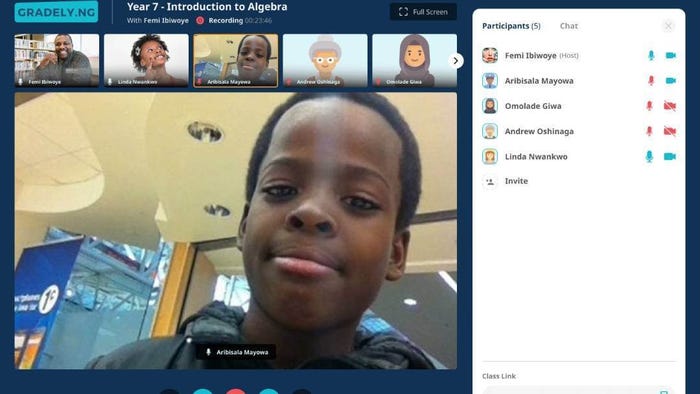Hot startup of the month: Nigeria's GradelyHot startup of the month: Nigeria's Gradely
Nigerian AI-based ed-tech solution Gradely is an adaptive learning app that recommends video lessons, practice questions and on-demand tutors to help students master challenging subject areas.

According to PwC, artificial intelligence (AI) will add $15.7 trillion to the global GDP by 2030: $6.6 trillion from increased productivity and $9.1 trillion from consumption effects. Africa too will benefit from this economic impact, but it is perhaps socially that the continent stands to gain most from the advancements in the space.
In markets where healthcare and education systems are inadequate, or where not enough people have access to basic financial services, the social impact of AI has the potential to outweigh even the demonstrable benefits from an economic perspective and create economic benefits down the road.
In the vanguard on the education side is Nigeria's Gradely, an adaptive learning app that recommends video lessons, practice and on-demand tutors to help students master challenging subject areas.
"We create personalized learning paths for each student using prior assessment performance. Students take an initial diagnostic test to begin their learning journey in standalone mode. When students connect to their schools, the app is able to use data from homework and class quizzes to make recommended results more relevant," explained Boye Oshinaga, co-founder and CEO of Gradely.
Schools use the app primarily to create assessments and recommend existing lessons to students, but they can also use it to create lessons, run live classes and manage their schools digitally, including by holding remedial video-conferencing classes, and automatically report class and student progress. These reports show topic-level strengths and weaknesses per child.
The app comes pre-loaded with assessment items marked by difficulty level and aligned to WASCCE and IGCSE curriculum topics for teachers to more efficiently and frequently create assessments.
AI impact
How the AI works is every day the app recommends practice questions or animated video lessons as well as real-time online tutors that are matched to students based on learning areas where they need to catch up. As a student clears a level of mastery, the app keeps automatically stringing practice questions of increasing difficulty until they achieve 100% mastery. This is just the beginning.
"Over time, we expect that we will have enough data to compare kids state-wide or nationally, predict class and national exam scores, measure teacher or tutor impact on learning, help schools make better decisions about teacher training material or teacher hiring, and finally, help parents make better decisions on tutors or schools that match their child(ren)'s learning process," Oshinaga said.
Oshinaga and co-founder Oluwaseyi Adelaju have a track record in the ed-tech space, having previously built a school discovery website that 3,000 private schools used to acquire parent customers.
"On a visit to one of the schools, we met a parent who was clearly dissatisfied with her child failing Mathematics two terms in a row," said Oshinaga.
"The child's class teacher was confused as to what he could have done differently. Probing, I found out that data about the child's strengths and weaknesses early on would have made a huge difference. In a separate survey of 800 parents we conducted, we found a correlating fact that parents said that their children's academic performance most influenced their decision to switch schools, and they switched schools every three years on average."

Gradely's online platform.
Oshinaga and Adelaju set about building a simple digital homework tool with the thesis that if they were able to digitize and map assessment to find learning gaps early, it would have the building block to create personalized, more effective learning for kids.
"We asked ten schools to join our pilot. Once we switched to public beta, we had 60 other schools sign up in one month," Oshinaga added.
The onset of the pandemic only increased initial uptake, for many reasons.
"No one had anticipated COVID-19, but for the first time in many decades, the meaning of the 'classroom' changed. Schools wanted us to build a robust digital school system and preferred us to alternatives because we had a curriculum-aligned content library and offered differentiated learning tools to improve learning outcomes," said Oshinaga.
"Parents started to become more active in their children's education and began to use our app to homeschool their kids."
Gradely launched in February and had 112 schools sign up in its first week. Now, it has 700 schools that it is busy onboarding, as well as 10,060 students with 1,500 monthly student subscriptions.
Filling learning gaps
The potential impact of a solution like this, at scale, is huge. According to the UN's World Development Report, nine out of ten students in Africa are in school, but not learning. Around half of 1.5 million secondary school students fail prerequisite subjects like Maths and English in exit exams every year, meaning the majority of school-leaving children fail to get university-qualifying grades.
"One of the reasons for this failure is that schools, parents, and teachers are unable to successfully catch and remedy learning gaps when they first surface; and because there is such a dense curriculum to comb through, students move to new topics, school terms and class years without enough opportunity to remedy learning gaps," said Oshinaga.
Gradely looks to fix this and is taking advantage of the boost given to ed-tech solutions by the pandemic. Being locally based, meanwhile, might give it an edge in terms of securing a big enough share of the Nigerian education space.
This is because many of its competitors are either international parent-focused apps that are neither localized nor curriculum-aligned; or international school-focused apps like Google Classroom and Microsoft Teams that suffer for the same reasons.
Oshinaga said that local parent-focused apps are less adaptive than Gradely's, while local school-focused apps have mostly been built as admin and not learning-first systems.
Expanding horizons
Gradely has received grants and VC funding totaling over $250,000 from organizations like Norrsken Foundation, Microtraction, Ventures Platform and Diaspora Angel Network.
Currently operational in Lagos, it plans to scale across Africa and Europe – in countries like Ghana, South Africa and the UK – within the next two to three years.
Want to know more about technologies like AI, ML, IoT and smart cities? Check out our dedicated Emerging Tech content channel here on Connecting Africa.
"Ed-tech in Africa is a US$1.5 billion market and is growing. Out of this market, about US$500 million is private sector and addressable by Gradely. We run on a B2B2C model, and we are entirely school-focused because we discovered that adoption of our LMS by schools, backed up with referrals and some influencer marketing, will drive parent subscription at a faster and more cost-effective rate," said Oshinaga.
"The cost of acquiring each new student customer via direct selling to parents is too high to ensure good gross margins and to keep the business profitable. We're resolving this by driving massive adoption by schools first and then leveraging them for brand awareness and credibility with parents to drive lower costs. We are also developing and deploying lower-cost acquisition channels such as email marketing, social media, press and referral campaigns."
Related posts:
* Top image source: Family photo created by rawpixel.com - www.freepik.com.
_(1)_(1).jpg?width=700&auto=webp&quality=80&disable=upscale)
.jpg?width=700&auto=webp&quality=80&disable=upscale)
_(1).jpg?width=700&auto=webp&quality=80&disable=upscale)

.jpg?width=700&auto=webp&quality=80&disable=upscale)
.jpg?width=700&auto=webp&quality=80&disable=upscale)
_(1).jpg?width=700&auto=webp&quality=80&disable=upscale)
.jpg?width=700&auto=webp&quality=80&disable=upscale)

.jpg?width=700&auto=webp&quality=80&disable=upscale)